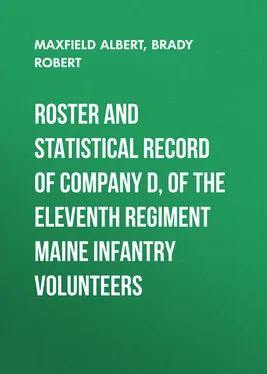Albert Maxfield - Roster and Statistical Record of Company D, of the Eleventh Regiment Maine Infantry Volunteers
Здесь есть возможность читать онлайн «Albert Maxfield - Roster and Statistical Record of Company D, of the Eleventh Regiment Maine Infantry Volunteers» — ознакомительный отрывок электронной книги совершенно бесплатно, а после прочтения отрывка купить полную версию. В некоторых случаях можно слушать аудио, скачать через торрент в формате fb2 и присутствует краткое содержание. Жанр: foreign_antique, foreign_prose, на английском языке. Описание произведения, (предисловие) а так же отзывы посетителей доступны на портале библиотеки ЛибКат.
- Название:Roster and Statistical Record of Company D, of the Eleventh Regiment Maine Infantry Volunteers
- Автор:
- Жанр:
- Год:неизвестен
- ISBN:нет данных
- Рейтинг книги:5 / 5. Голосов: 1
-
Избранное:Добавить в избранное
- Отзывы:
-
Ваша оценка:
- 100
- 1
- 2
- 3
- 4
- 5
Roster and Statistical Record of Company D, of the Eleventh Regiment Maine Infantry Volunteers: краткое содержание, описание и аннотация
Предлагаем к чтению аннотацию, описание, краткое содержание или предисловие (зависит от того, что написал сам автор книги «Roster and Statistical Record of Company D, of the Eleventh Regiment Maine Infantry Volunteers»). Если вы не нашли необходимую информацию о книге — напишите в комментариях, мы постараемся отыскать её.
Roster and Statistical Record of Company D, of the Eleventh Regiment Maine Infantry Volunteers — читать онлайн ознакомительный отрывок
Ниже представлен текст книги, разбитый по страницам. Система сохранения места последней прочитанной страницы, позволяет с удобством читать онлайн бесплатно книгу «Roster and Statistical Record of Company D, of the Eleventh Regiment Maine Infantry Volunteers», без необходимости каждый раз заново искать на чём Вы остановились. Поставьте закладку, и сможете в любой момент перейти на страницу, на которой закончили чтение.
Интервал:
Закладка:
On the 24th of May, General Naglee's brigade dislodged the enemy from the vicinity of Seven Pines and secured a strong position for our advance. McClellan says also that on the 25th, under cover of a movement by General Naglee, the whole Fourth Corps took up and began to fortify a position at Seven Pines. On the 28th his record also shows Casey's division was moved forward to Fair Oaks, three-quarters of a mile in advance of Seven Pines, leaving General Couch at the works at Seven Pines. General Casey immediately began a new line of rifle pits and a small redoubt for six field guns to cover our new position. Here we were engaged in constant skirmishing and picket service until May 31, when the battle of Fair Oaks was fought. When about noon of the 31st of May the Rebel Commands of D. H. Hill, Huger, Longstreet and G. W. Smith swept down on Casey's division, D and other companies of the regiment were on the picket line, D on the extreme right. The few members of D left in camp joined regiments moving to the front as they came forward, and with the rest of Naglee's Brigade, to use the language of General McClellan's official report concerning our brigade, "struggled gallantly to maintain the redoubt and rifle pits against the overwhelming masses of the enemy." As individuals those of D so engaged did their duty, both here and in the later stands made at General Couch's rifle pits. One of them, Private Gray, reported missing, was undoubtedly killed while voluntarily attached to some stranger organization, receiving burial with their dead of his adopted regiment. But the story of D as a company we will tell from information furnished us by its First Sergeant, Brady, who commanded and directed its movements when it made its stand on the picket line against an advancing line of battle. The portion of the Regiment not on picket was taken into the battle by then Major Campbell, and shares with the 104th Pennsylvania the warm encomiums of official writers on the heroic bravery shown by these two regiments that day.
The night before the battle of Fair Oaks was one of a terrible storm, that we all know. D went on picket that evening, occupying the extreme right of the line, an entirely unsupported position. The men passed a miserable night, watching in darkness and storm, sheltering themselves as they best could and still remain alert, for all the signs pointed to an early attack on us; the pressure of the enemies skirmish lines, the plain movements of their troops, and the fact that they must either dislodge us or lose Richmond. Towards morning the storm ceased, and the day broke with the promise of clearness. Shortly afterwards Sergeant Brady came out of camp with Private Annis, then a detailed cook, Annis bearing a camp kettle in which he proceeded to prepare coffee, when the men partook of a rough breakfast. Soon Lieutenant Washington, of General Johnston's staff, rode unexpectedly into the line of D, having mistaken a road in carrying orders to some rebel command. Quickly halted, he ruefully yielded himself a prisoner, and under Captain Harvey's pilotage made an unwilling way to General Casey's headquarters. Captain Harvey failing to return, the command of the company devolved upon Second Lieutenant Johnson, as First Lieutenant Stanwood was away sick. The capture of Lieutenant Washington made the pickets doubly alert. Besides, General Naglee himself rode out to their line to make observations, and warned them that they were liable to be attacked at any moment. Soon great activity was displayed by the rebel pickets in the immediate front, and sharp picket fighting took place during the forenoon. A little after noon the roar of the attack on the left was heard. It was uncertain what the pickets should do. Lieutenant Johnson and Corporal Keene moved out on the right to learn, if they could, what force, if any, guarded the flank. They found it entirely unguarded, and moved along until they fell in with Sumner's advance, when they were occupied in giving information concerning the movements of the enemy, and the bearing of the roads to General Sumner's aids.
Sergeant Brady had been left in command of the company by Lieutenant Johnson, and shortly a rebel line of battle appeared moving towards the line held by D. Under Sergeant Brady's orders, some of the men began to barricade the road they centered on by falling trees across it, the others keeping up a rapid fire on the enemy to give the idea by their boldness that they covered a line of battle, while really between them and Fair Oaks there was then no force whatever. This ruse succeeded to an unexpected degree, the rebel line of battle halting, throwing out a strong skirmish line, and making an elaborately cautious advance. Of course their skirmishers easily flanked our forlorn pickets, and curling them back in spite of their stubborn resistance, finally scattered them through the woods.
Before the rebel onset, Sergeant Brady, realizing by the sound of the battle that he was cut off from his camp, had carefully cautioned the men to make their line of inevitable retreat toward the right and rear, and fortunately for most of them they followed these orders, reaching our lines in safety. Those that were captured were Sergeant Bassett, Corporal Dakin, Musician Strickland, Privates William and Moses Sherman, House, and lastly Sergeant Brady himself, who, the captor of two rebel soldiers, was triumphantly following his prisoners into our lines as he supposed, when, reaching the railroad, a line of rebel infantry confronted him, and he found it necessary to exchange place with his own prisoners, who, you may be sure, took a great pleasure in escorting him to Richmond. These, with Private Gray killed, and Private Blaine wounded, cover the loss of D at the battle of Fair Oaks.
It will be seen by this, that when night fell on the first day of the battle of Fair Oaks, Company D was somewhat scattered. Some of its members had joined the colors, but many were still wandering in search of them, while a stout detachment was already housed in Libby Prison. But before the next day noontime, the company was fully organized again under the command of Lieutenant Johnson, Captain Harvey relinquishing the command, pending the acceptance of his resignation, which circumstances forced him to send in.
The regiment took no part in the second day's fighting, constituting part of the reserve. That night they lay in the edge of a piece of woods. During it certain mules belonging to the Q.M. Department of our army were stampeded, galloping in a body along our line of battle, the rattling of the chains of their harnesses which had not been removed when they were unhitched from the wagons, so resembling the clanking of the scabbards of galloping cavalrymen, that many of the Eleventh, more than will confess it, were sure that the rebel Stuart and his cavalry were upon us. For a few minutes the utmost consternation and confusion prevailed, but the truth was quickly known and quiet restored. Of course no one was really scared, still it is said that some of the Eleventh, and they not all of the rank and file either, displayed an unexpected aptitude for tree climbing during the misconception.
After the battle we had occasion to look over the battle-field, for of course we did not know that our missing were captured, they might be killed or wounded.
It told the same ghastly story of war as that of Williamsburg. Our hastily abandoned camp had been rummaged by the Confederates and the shelter tents and old blankets taken from it to spread on the wet ground as they lay in line of battle. The long line of wet trampled tents and blankets told the exact position the enemy occupied the night of the first day of the battle. The kettles still hung over the charred embers of the extinguished cook fires, the headquarters' tents still stood in their places, the horns of the band still hanging on the limbs of the apple trees they were hanging on when the band took its hasty departure for Augusta. It tooted for us no more. In a day or two our division was placed under command of General Peck and ordered to guard the Railroad Bridge and Bottoms Bridge; Couch's division guarding the fords across the White Oak Swamp. For some days our position was at the bridges, we camping at the end of the Railroad Bridge, just where the Confederate artillery had stood when D and its Federal piece of artillery first opened fire on each other from opposite ends of the bridge. Then came the swift and almost unheralded march of Jackson from the Valley to the south side of the Chickahominy and the Seven Days' Battles. The story of the Battle of Gaines' Mills was brought to us by the seemingly interminable army of the disheartened troops that for hours filed across the Railroad Bridge, without officers or orders, clamoring that all was lost, and that Jackson was moving swiftly towards us, crushing all opposition.
Читать дальшеИнтервал:
Закладка:
Похожие книги на «Roster and Statistical Record of Company D, of the Eleventh Regiment Maine Infantry Volunteers»
Представляем Вашему вниманию похожие книги на «Roster and Statistical Record of Company D, of the Eleventh Regiment Maine Infantry Volunteers» списком для выбора. Мы отобрали схожую по названию и смыслу литературу в надежде предоставить читателям больше вариантов отыскать новые, интересные, ещё непрочитанные произведения.
Обсуждение, отзывы о книге «Roster and Statistical Record of Company D, of the Eleventh Regiment Maine Infantry Volunteers» и просто собственные мнения читателей. Оставьте ваши комментарии, напишите, что Вы думаете о произведении, его смысле или главных героях. Укажите что конкретно понравилось, а что нет, и почему Вы так считаете.












